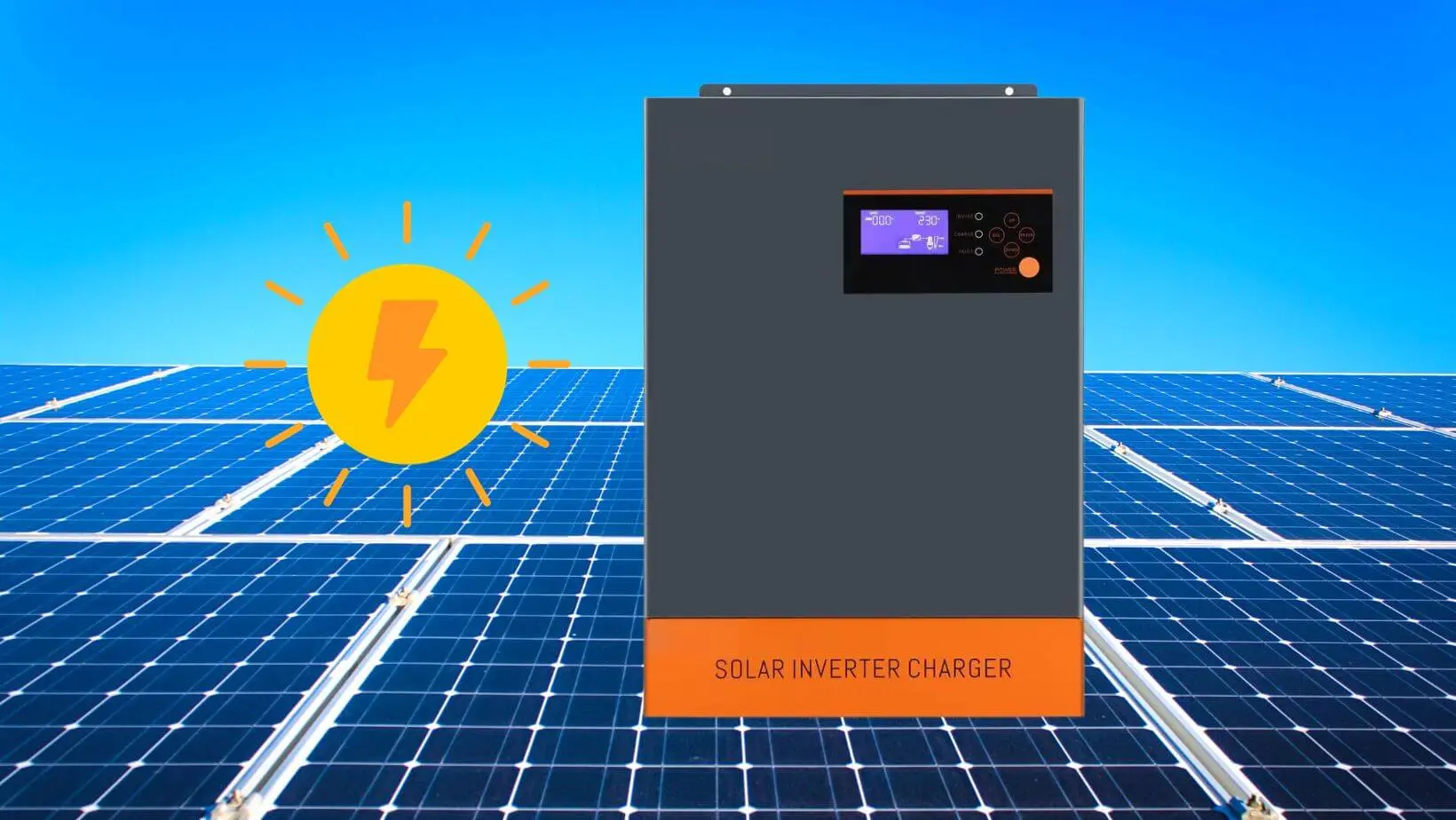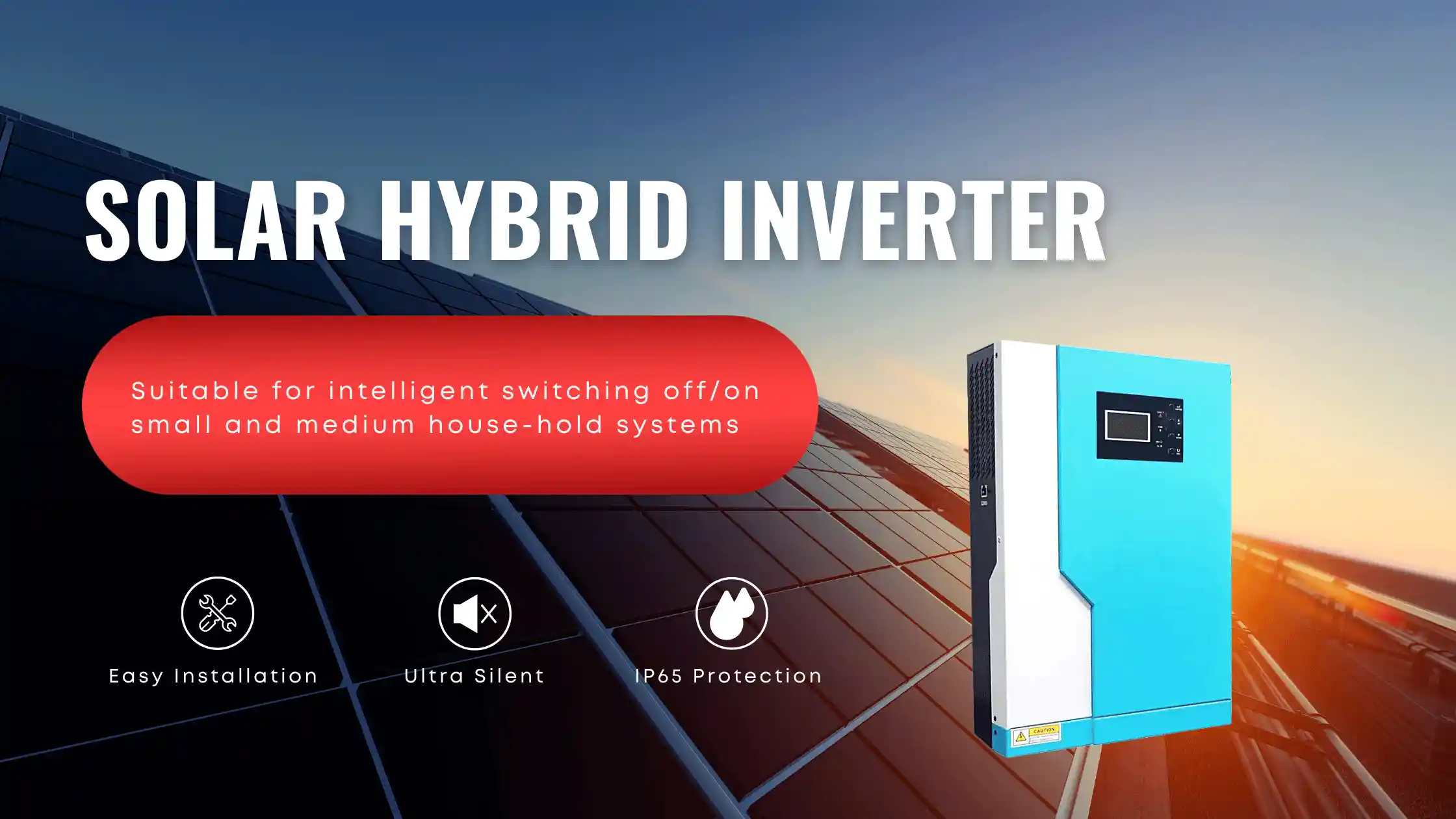HYBRID SOLAR INVERTERS IN UGANDA

Hybrid solar inverters are ones that mix solar energy generated by solar panels, batteries, and the traditional electrical grid. Photovoltaic installations for self-consumption are just one of its many applications.
The hybrid inverter changes the direct power from the solar panels into alternating current for household use.
Watch the full video on our hybrid solar inverters in Uganda.
When the batteries are not sufficient to power the inverters during the day or when the batteries are low on charge, the hybrid inverter has the unique characteristic of being powered by the traditional electrical grid.
Are you read to power your home, Let Us Talk: +256392001947
Characteristics of Hybrid Solar Inverters
This kind of hybrid inverter functions as an intelligent energy management system, introducing solar energy generated by solar panels into the home’s electrical grid and acting as a battery charger and storage device for excess energy when it is produced.
This creates an effective and efficient energy management system. Additionally, in extreme circumstances of solar energy shortfall, the hybrid inverter receives power from the power grid, preventing interruptions in the home’s electricity supply.
In order to avoid disrupting the power supply, the hybrid performs three main tasks: it converts direct current into alternating current, charges batteries, and hybridizes with the electrical network.

Features
Hybrid solar inverters are a type of inverter that combines the features of a traditional inverter with those of a battery-based inverter.
Here are some common features of hybrid solar inverters:
Grid-tie capability: Hybrid solar inverters are capable of connecting to the grid, allowing the excess power generated by the solar panels to be sent back to the grid and used by others.
Battery-based capability: Hybrid solar inverters also have the capability to charge and discharge batteries, which allows for energy storage and use during power outages.
MPPT (Maximum Power Point Tracking) technology: This feature allows the inverter to optimize the energy output from the solar panels and make the most efficient use of the available sunlight.
Multi-mode operation: Hybrid solar inverters can operate in different modes such as grid-tie, off-grid, and hybrid mode, giving you more flexibility.
Remote monitoring: Many hybrid solar inverters have the capability to be monitored remotely, which allows you to keep an eye on the system’s performance and make any necessary adjustments.
Automatic transfer switch: This feature allows the inverter to automatically switch between grid power and battery power in case of a power outage.
User-friendly interface: Many hybrid solar inverters have a user-friendly interface which makes it easy to monitor and control the system.
Advanced Safety features: Some hybrid solar inverters have advanced safety features such as over-voltage, over-current, short-circuit, and over-temperature protection which ensures the safety of the system and the appliances connected to it.
Are you read to power your home, Let Us Talk: +256392001947
What is the price of hybrid inverters in Uganda

The price of a hybrid inverter in Uganda will vary depending on the size and specific features of the inverter. However, generally speaking, hybrid inverters tend to be more expensive than traditional grid-tie inverters due to their added capabilities and features.
Hybrid inverters can range anywhere from around 1Milion UGX to 5.5 Million UGX or more, depending on the power rating, features, and brand of the inverter. Some of the factors that can affect the price of a hybrid inverter include its power rating, the number of input and output ports, and the quality of the components used in its construction.
It’s important to note that the price of a hybrid inverter is just one aspect of the overall cost of a solar power system. The cost of solar panels, batteries, installation and other components should also be considered.
It’s recommended to check prices from different suppliers and compare them to get the best deal. Also, it’s always a good idea to consult with a professional to get an accurate estimate of the costs of a solar power system, including the inverter, based on your specific needs and location
What is the difference between a normal Inverter and hybrid Inverter in Uganda
A normal inverter converts DC (direct current) electricity from a battery or solar panel into AC (alternating current) electricity that can be used by household appliances and devices. A hybrid inverter, on the other hand, is a combination of a normal inverter and a charge controller. It not only converts DC to AC, but it also manages the charging of the batteries when connected to a solar panel or grid. The hybrid inverter can also automatically switch between different energy sources, such as solar, battery, and grid power, to ensure a continuous power supply. This makes them more versatile and efficient than normal inverters.
Here are some frequently asked questions about hybrid solar inverters in Uganda
A hybrid solar inverter is a combination of a normal inverter and a charge controller. It converts DC electricity from a solar panel or battery into AC electricity that can be used by household appliances and devices. It also manages the charging of the batteries when connected to a solar panel or grid.
A hybrid solar inverter works by converting DC electricity from a solar panel or battery into AC electricity that can be used by household appliances and devices. It also manages the charging of the batteries when connected to a solar panel or grid. The inverter can also automatically switch between different energy sources, such as solar, battery, and grid power, to ensure a continuous power supply.
The benefits of a hybrid solar inverter include:
- Increased energy efficiency and savings
- Reduced dependence on the grid
- Improved reliability and backup power
- Increased battery life
Yes, you can add battery storage to your existing solar system by adding a hybrid solar inverter. This will allow you to store excess solar energy for use during times when the sun is not shining or during power outages.
The lifespan of a hybrid solar inverter depends on the quality of the product, but most inverters are designed to last for around 20-25 years.
